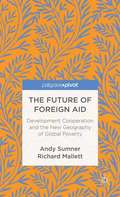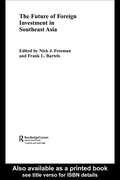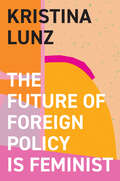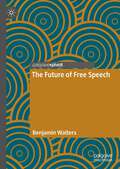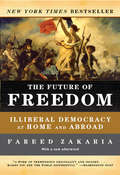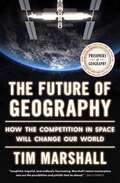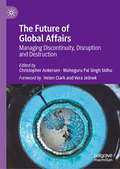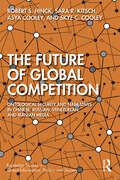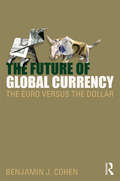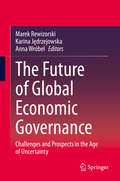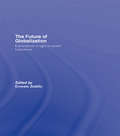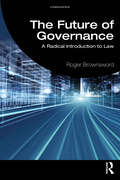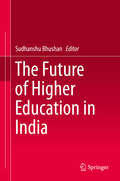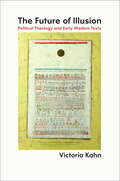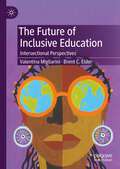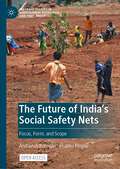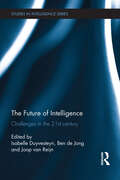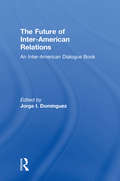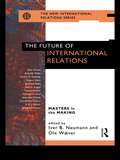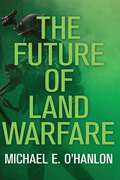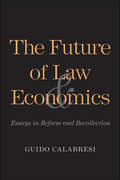- Table View
- List View
The Future of Foreign Aid: Development Cooperation and the New Geography of Global Poverty
by Andy Sumner Richard MallettSumner and Mallett review the literature on aid in light of shifts in the aid system and the increasing concentration of the world's poor in middle-income countries. As a consequence, they propose a series of practical, policy relevant options for future development cooperation, with the aim of provoking discussion and informing policy.
The Future of Foreign Investment in Southeast Asia (Routledge International Business in Asia)
by Nick J. Freeman Frank L. BartelsThis book explains the dynamics behind southeast Asia's foreign investment activity, and looks at the region's options for reviving its reputation as an attractive host for foreign investors. Each chapter focuses on a key element; together, they portray southeast Asia's foreign investment profile and prospects. By bringing these key interlocking elements together under a single cover, the book aims to provide a more profound understanding of the challenges southeast Asian countries face in their on-going attempts both to attract new foreign investment inflows and to continue hosting substantial existing foreign-invested assets.
The Future of Foreign Policy Is Feminist
by Kristina LunzAs old white men continue to dominate the national and international stages, the needs of women and minorities are constantly ignored. International politics are shaped by a ruthless competition for advantage, and the world is full of conflicts, crises and wars. Things have to change. Activist and political scientist Kristina Lunz is on a mission to do just that. In her work from New York to Bogotá, from Germany to Myanmar, she became aware of a stubborn unwillingness to think past the status quo and to embrace new, innovative voices from marginalized groups. She also saw that the tradition of feminist activism combined brilliantly with diplomacy: both require grim tenacity, boundless creativity and a solutions-oriented approach. In her attempt to reconfigure the field of foreign policy, she aims to set in motion a paradigm shift, replacing grandiose displays of military might with feminism, solidarity and climate justice. A feminist foreign policy requires the promotion of equal rights in the handling of foreign affairs and security matters worldwide, with a particular focus on marginalized and politically underrepresented groups. Ultimately, this is nothing less than an inclusive, visionary policy for the twenty-first century, one where security and prosperity, health and climate justice are possible – in other words: where peace is possible for everyone, everywhere.
The Future of Free Speech
by Benjamin WaltersThis book dives headfirst into the contemporary controversy over the limits of free speech. Changing conceptions of what constitutes legitimate harm coupled with the advent of the internet and social media have provided a challenging environment for defining the boundaries of acceptable speech in our contemporary society. This book argues that these problems emerge due to flaws in our free speech framework, leaving the argument for free speech vulnerable to becoming inverted into a justification for censorship. In response, this book argues for a version of free speech based on a framework of toleration. Drawing on the work of the philosopher Rainer Forst, a new justification for free speech is formulated – reflexive freedom of speech – which aims to overcome past issues and justify free speech in a way that is universal, consistent and just.
The Future of Freedom: Illiberal Democracy at Home and Abroad
by Fareed ZakariaWhat we need to do to maintain true democracy.
The Future of Freedom: Illiberal Democracy at Home and Abroad (Revised Edition)
by Fareed Zakaria"A work of tremendous originality and insight. ... Makes you see the world differently."--Washington Post Translated into twenty languages ?The Future of Freedom ?is a modern classic that uses historical analysis to shed light on the present, examining how democracy has changed our politics, economies, and social relations. Prescient in laying out the distinction between democracy and liberty, the book contains a new afterword on the United States's occupation of Iraq and a wide-ranging update of the book's themes.
The Future of Gay Rights in America
by H.N. HirschSandra Day O'Connor has called the gay rights movement "the first important civil rights struggle of the twenty-first century." Recent court decisions to overturn sodomy laws and to recognize gay marriage have emboldened activists, but have also resulted in a tremendous backlash, not the least of which has been a call for a constitutional amendment defining marriage as only between members of the opposite sex. Through its historical and legal contextualization of these decisions The Future of Gay Rights in America is essential for understanding an epochal moment in the history of gay rights.
The Future of Geography: How the Competition in Space Will Change Our World (Politics of Place #4)
by Tim MarshallFrom the New York Times bestselling author of Prisoners of Geography and leading geopolitics expert comes an &“insightful, hopeful, and endlessly fascinating&” (Daily Express) book on today&’s space race—including the increasingly tense power struggle between the US, China, and Russia and what it means for all of us here on Earth.Spy satellites orbiting the moon. Space metals worth more than most countries&’ GDP. People on Mars within the next ten years. This isn&’t science fiction—it&’s reality. Humans are venturing up and out, and we&’re taking our competitive spirit with us. Soon, what happens in space will shape human history as much the mountains, rivers, and seas have impacted civilizations around the world. It&’s no coincidence that Russia, China, and the USA are leading the way. The next fifty years will change the face of global politics and the world order as we know it. In this must-read work, bestselling author Tim Marshall navigates the new astropolitical reality to show how we got here and where we&’re heading. Extensively researched, &“thought-provoking&” (Popular Science), and drawing on the latest information from intelligence, government, and civilian institutions, this book provides a detailed, clear account of the new space race, the power rivalries, and how technology, economics, and war have a ripple effect on everyone across the globe. Written with all the insight and wit that have made Marshall one of the world&’s most popular and trusted writer on geopolitics, The Future of Geography is an essential read about global power, politics, and the future of humanity.
The Future of Global Affairs: Managing Discontinuity, Disruption and Destruction
by Christopher Ankersen Waheguru Pal Singh SidhuThis book has two aims: first, to examines the evolving role of the state, and non-state actors, coupled with trends – including globalization, populism, post-truth, enlightened capitalism, feminist foreign policy, energy disruption, climate change, emerging cyber and other technologies, and the crisis in UN-centered multilateralism, to offer a prescient assessment of global affairs in the near future; and, second, to solidify the transdisciplinary nature of Global Affairs as a field of study that transcends the traditional conceptual silos.
The Future of Global Competition: Ontological Security and Narratives in Chinese, Iranian, Russian, and Venezuelan Media (Routledge Studies in Global Information, Politics and Society)
by Skye C. Cooley Robert Hinck Asya Cooley Sara KitschWith today’s social and geopolitical order in significant flux this project offers vital insight into the future global order by comparatively charting national media perceptions regarding the future of global competition, through the lens of Ontological Security (OS). The authors employ a mixed-method approach to analyze 620 news articles from 47 Russian, Chinese, Venezuelan, and Iranian news sources over a five-year period (2014-2019), quantitatively comparing the drivers of their visions while providing in-depth qualitative case studies for each nation. Not only do these narratives reveal how these four nations understand the current global order, but also point to their (in)flexibility and agentic capacity for reflection in adapting, even shaping the future order, and their identity-roles within it, around an economic and diplomatic battleground. The authors argue these narratives create trajectories with inertial effects grounded in their OS needs, providing enduring insights into their behavior and interests moving into the future. The Future of Global Coopetition will help readers understand how influential nations typical aligned in opposition to the US, envision the drivers of global competition and the make-up of the future international system. Those engaged in the study of media, global politics, international relations, and communication will find this book to be a critical source.
The Future of Global Currency: The Euro Versus the Dollar
by Benjamin J. CohenCan the euro challenge the supremacy of the U.S. dollar as a global currency? From the time Europe’s joint money was born, many have predicted that it would soon achieve parity with the dollar or possibly even surpass it. In reality, however, the euro has remained firmly planted in the dollar’s shadow. The essays collected in this volume explain why. Because of America’s external deficits and looming foreign debt, the dollar can never be as dominant as it once was. But Europe’s money is unable to mount an effective challenge. The euro suffers from a number of critical structural deficiencies, including an anti-growth bias that is built into the institutions of the monetary union and an ambiguous governance structure that sows doubts among prospective users. As recent events have demonstrated, members of the euro zone remain vulnerable to financial crisis. Moreover, lacking a single voice, the bloc continues to punch below its weight in monetary diplomacy. The world seems headed toward a leaderless monetary order, with several currencies in contention but none clearly dominant. This collection distils the views of one of the world’s leading scholars in global currency, and will be of considerable interest to students and scholars of international finance and international political economy.
The Future of Global Economic Governance: Challenges and Prospects in the Age of Uncertainty
by Marek Rewizorski Karina Jędrzejowska Anna WróbelIn light of new global challenges for international cooperation and coordination, such as the revival of protectionism, surge of populism, or energy-related issues, this volume highlights possible scenarios for the future of Global Economic Governance (GEG). The contributing authors analyze the substance of GEG as a normative framework for resolving collective action issues and promoting cross-border co-ordination and co-operation in the provision or exchange of goods, money, services and technical expertise in the world economy. Furthermore, the book examines drivers of fundamental shifts in global economic steering and covers topics such as power and authority shifts in the global governance architecture, technological and energy-related challenges, and the role of the G20 and BRICS in shaping global economic governance.“This book provides a very timely and nuanced account of the challenges facing the established global order.”Andrew F. Cooper (Professor of Political Science at the University of Waterloo)“This valuable collection from a new generation of innovative scholars of global economic governance offers insights from a broad range of theoretical approaches to the central policy issues of the day”John Kirton (Director of the Global Governance Program, Munk School of Global Affairs, University of Toronto)
The Future of Globalization: Explorations in Light of Recent Turbulence
by Ernesto ZedilloErudite and topical, this well balanced treatment, with essays from world renowned contributors including the former President of Ireland – Mary Robinson, Jagdish Bhagwati and Nobel prize winner Joseph Stiglitz, considers the forces that propel globalization and those that resist it. Local and regional experiences from Bangladesh, China, India, Latin America and the Middle East are analyzed along with some of globalization’s most potent risks. Giving voice to sophisticated and illustrative reasoning, The Future of Globalization offers useful insights into the extraordinary human achievement brought about by increasing international economic integration, interdependence and interconnectedness, and shows how this has been a powerful force for the progress of humankind. The contributors take stock of the debate on globalization and explore ways to make globalization more beneficial for individuals, communities and countries, as well as ways to reduce its insufficiencies and mitigate the risks it faces. This book will benefit all students of economics, political science and international relations, among others, and is useful to courses that focus on globalization and its impacts.
The Future of Governance: A Radical Introduction to Law
by Roger BrownswordThis book offers a radically different introduction to law, one that reflects the challenges and opportunities presented by the rapid technological developments of our time.Traditionally, law has been about historic principles and rules and their application to a particular set of facts; and courts, judges, and disputes have been central to the legal enterprise. Against this approach, this book highlights four radical and revisionist ideas: by bringing modern technologies into the foreground; by presenting law as one particular mode of governance in a larger picture of governance that now includes technological modalities; by insisting that we have to think outside the traditional doctrinal box to engage with a broad range of governance questions; and by emphasising that human communities cannot flourish without good governance to which both lawyers and law are central. These four radical threads are woven into a discussion of the modern landscape of law, and together they offer a distinctly contemporary contribution to the quest for good governance. The challenge for lawyers now, the book maintains, is to contribute to thinking, both locally and globally, about how we take advantage of the opportunities presented by the newest technology, without compromising the essential conditions for human life and co-existence, and without losing what we value in law’s governance.This book is aimed at students who are studying law at university and legal academics, and others, interested in the current and future impact of technology on law.
The Future of Higher Education in India
by Sudhanshu BhushanThe book analyses various challenges emanating from privatization, globalization and public financial crunch to understand the future directions of higher education in India. The book presents a careful understanding of structure, finance and governance of higher education and advocates a new way to look at increasing the capability of students to secure their future. Attention has also been drawn to the inequalities prevailing in the system of higher education and pursuing inclusive approach so as to have sufficient employment opportunities for students in the labour market. The book is divided into three parts. Part 1 deals with the future in terms of university structure and functions, Part 2 deals with the future of financing higher education and Part 3 deals with capabilities required by teachers for the future of universities. It is an interesting collection of various themes in different chapters which are authored by serious researchers. All policy makers, university administrators and teachers and researchers of higher education interested in governance, financing, teaching as well as research in the area of higher education will find the contents of the book relevant. The book will benefit in understanding the challenges of higher education and help remodel the future of higher education in India.
The Future of Illusion: Political Theology and Early Modern Texts
by Victoria KahnIn recent years, the rise of fundamentalism and a related turn to religion in the humanities have led to a powerful resurgence of interest in the problem of political theology. In a critique of this contemporary fascination with the theological underpinnings of modern politics, Victoria Kahn proposes a return to secularismOCowhose origins she locates in the art, literature, and political theory of the early modern periodOCoand argues in defense of literature and art as a force for secular liberal culture. aKahn draws on theorists such as Carl Schmitt, Leo Strauss, Walter Benjamin, and Hannah Arendt and their readings of Shakespeare, Hobbes, Machiavelli, and Spinoza to illustrate that the dialogue between these modern and early modern figures can help us rethink the contemporary problem of political theology. Twentieth-century critics, she shows, saw the early modern period as a break from the older form of political theology that entailed the theological legitimization of the state. Rather, the period signaled a new emphasis on a secular notion of human agency and a new preoccupation with the ways art and fiction intersected the terrain of religion. Reclaiming a role for the arts in contemporary debates about liberalism and political theology, a"The Future of Illusion"aarticulates a new defense of what Hans Blumenberg called OC the legitimacyOCO of our modern secular age. "
The Future of Inclusive Education: Intersectional Perspectives
by Valentina Migliarini Brent C. ElderThis book addresses the tensions of existing theories and practices of inclusive education from an international perspective. Adopting Disability Critical Race Theory in Education (DisCrit) and Critical Disability Studies (CDS), the authors expose how race neutral knowledge characterizes inclusive education and exhorts readers to consider how intersectional perspectives provide more complex and nuanced understandings about ways in which racism and ableism simultaneously circulate as intersecting oppressions in schools and societies and across geographical borders. The authors begin by engaging in a critical analysis of the genesis of inclusive education before exploring how existing policies and practices of inclusive education in the global North evade the collusive nature of oppressions faced by minoritized students with disabilities and are uncritically transferred into the global South. Ultimately, the book encourages readers to reconceptualize inclusive education and move towards developing and sustaining transformative notions of global justice.
The Future of India's Social Safety Nets: Focus, Form, and Scope (Palgrave Studies in Agricultural Economics and Food Policy)
by Prabhu Pingali Andaleeb RahmanIndia has learned what to do and what not to do when it comes to implementing policy to address human suffering. The COVID-19 pandemic unified the international response in similar ways, and the world has a lot to learn about key initiatives in India that have been implemented since India's independence. This open-access book includes key learnings about the conceptualization, design, and impact of social welfare programs in India spanning more than a 75-year period.The Future of India's Social Safety Nets provides a comprehensive analysis of these systems by combining insights from a wealth of interdisciplinary scholarship on social protection, economic development, and social policy. It covers India’s social development in terms of three essential aspects of policy design: focus (intended beneficiaries), form (transfer modalities), and scope (developmental objectives). Highlighting the developmental achievements and shortcomings of the myriad of social welfare schemes, this book proposes a framework to foster human resilience through social protection.This is an open-access book.
The Future of Intelligence: Challenges in the 21st century (Studies in Intelligence)
by Isabelle Duyvesteyn Ben De Jong Joop Van ReijnThis volume discusses the challenges the future holds for different aspects of the intelligence process and for organisations working in the field. The main focus of Western intelligence services is no longer on the intentions and capabilities of the Soviet Union and its allies. Instead, at present, there is a plethora of threats and problems that deserve attention. Some of these problems are short-term and potentially acute, such as terrorism. Others, such as the exhaustion of natural resources, are longer-term and by nature often more difficult to foresee in their implications. This book analyses the different activities that make up the intelligence process, or the ‘intelligence cycle’, with a focus on changes brought about by external developments in the international arena, such as technology and security threats. Drawing together a range of key thinkers in the field, The Future of Intelligence examines possible scenarios for future developments, including estimations about their plausibility, and the possible consequences for the functioning of intelligence and security services. This book will be of much interest to students of intelligence studies, strategic studies, foreign policy, security studies and IR in general.
The Future of Inter-American Relations
by Jorge I. DominguezFirst Published in 2000. Routledge is an imprint of Taylor & Francis, an informa company.
The Future of International Law
by Joel P. TrachtmanThe world is changing rapidly and there are increasing calls for international and legal responses. Social changes in areas such as globalization, development, demography, democratization and technology are growing in importance for both citizens and states. Over time this will be reflected in international law and organizational structures, which will have more prominence in governmental functions. In this sense the future of international law is global government. This book draws together the theoretical and practical aspects of international cooperation needs and legal responses in critical areas of global concern and predicts that a more extensive, powerful and varied international legal system will be needed to cope with future opportunities and challenges.
The Future of International Relations: Masters in the Making? (New International Relations)
by Iver B. Neumann Ole WæverThis book presents the state of the art of international relations theory through an analysis of the work of twelve key contemporary thinkers; John Vincent, Kenneth Waltz, Robert O. Keohane, Robert Gilpin, Bertrand Badie, John Ruggie, Hayward Alker, Nicholas G. Onuf, Alexander Wendt, Jean Bethke Elshtain, R.B.J. Walker and James Der Derian. The authors aim to break with the usual procedure in the field which juxtaposes aspects of the work of contemporary theorists with others, presenting them as part of a desembodied school of thought or paradigm. A more individual focus can demonstrate instead, the well-rounded character of some of the leading oeuvres and can thus offer a more representative view of the discipline.This book is designed to cover the work of theorists whom students of international relations will read and sometimes stuggle with. The essays can be read either as introductions to the work of these theorists or as companions to it. Each chapter attempts to place the thinker in the landscape of the discipine, to identify how they go about studying International Relations, and to discuss what others can learn from them.
The Future of Land Warfare
by Michael E. O'HanlonWhat happens if we bet too heavily on unmanned systems, cyber warfare, and special operations in our defense?In today's U.S. defense policy debates, big land wars are out. Drones, cyber weapons, special forces, and space weapons are in. Accordingly, Pentagon budget cuts have honed in on the army and ground forces: this, after the long wars in Iraq and Afghanistan, seems like an appealing idea. No one really wants American boots on the ground in bloody conflicts abroad. But it is not so easy to simply declare an end to messy land wars. A survey of the world's trouble spots suggests that land warfare has more of a future than many now seem to believe.In The Future of Land Warfare, Michael O'Hanlon offers an analysis of the future of the world's ground forces: Where are large-scale conflicts or other catastrophes most plausible? Which of these could be important enough to require the option of a U.S. military response? And which of these could in turn demand significant numbers of American ground forces in their resolution? O'Hanlon is not predicting or advocating big American roles in such operations--only cautioning against overconfidence that we can and will avoid them.O'Hanlon considers a number of illustrative scenarios in which large conventional forces may be necessary: discouraging Russia from even contemplating attacks against the Baltic states; discouraging China from considering an unfriendly future role on the Korean peninsula; handling an asymmetric threat in the South China Sea with the construction and protection of a number of bases in the Philippines and elsewhere; managing the aftermath of a major and complex humanitarian disaster superimposed on a security crisis--perhaps in South Asia; coping with a severe Ebola outbreak not in the small states of West Africa but in Nigeria, at the same time that country falls further into violence; addressing a further meltdown in security conditions in Central America.
The Future of Land Warfare
by Michael E. O'HanlonWhat happens if we bet too heavily on unmanned systems, cyber warfare, and special operations in our defense?In today's U.S. defense policy debates, big land wars are out. Drones, cyber weapons, special forces, and space weapons are in. Accordingly, Pentagon budget cuts have honed in on the army and ground forces: this, after the long wars in Iraq and Afghanistan, seems like an appealing idea. No one really wants American boots on the ground in bloody conflicts abroad. But it is not so easy to simply declare an end to messy land wars. A survey of the world's trouble spots suggests that land warfare has more of a future than many now seem to believe.In The Future of Land Warfare, Michael O'Hanlon offers an analysis of the future of the world's ground forces: Where are large-scale conflicts or other catastrophes most plausible? Which of these could be important enough to require the option of a U.S. military response? And which of these could in turn demand significant numbers of American ground forces in their resolution? O'Hanlon is not predicting or advocating big American roles in such operations-only cautioning against overconfidence that we can and will avoid them.O'Hanlon considers a number of illustrative scenarios in which large conventional forces may be necessary: discouraging Russia from even contemplating attacks against the Baltic states; discouraging China from considering an unfriendly future role on the Korean peninsula; handling an asymmetric threat in the South China Sea with the construction and protection of a number of bases in the Philippines and elsewhere; managing the aftermath of a major and complex humanitarian disaster superimposed on a security crisis-perhaps in South Asia; coping with a severe Ebola outbreak not in the small states of West Africa but in Nigeria, at the same time that country falls further into violence; addressing a further meltdown in security conditions in Central America.
The Future of Law and Economics
by Guido CalabresiIn a concise, compelling argument, one of the founders and most influential advocates of the law and economics movement divides the subject into two separate areas, which he identifies with Jeremy Bentham and John Stuart Mill. The first, Benthamite, strain, "economic analysis of law," examines the legal system in the light of economic theory and shows how economics might render law more effective. The second strain, law and economics, gives equal status to law, and explores how the more realistic, less theoretical discipline of law can lead to improvements in economic theory. It is the latter approach that Judge Calabresi advocates, in a series of eloquent, thoughtful essays that will appeal to students and scholars alike.
